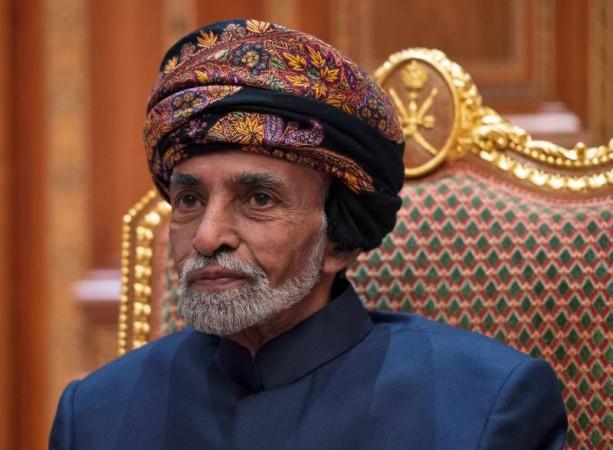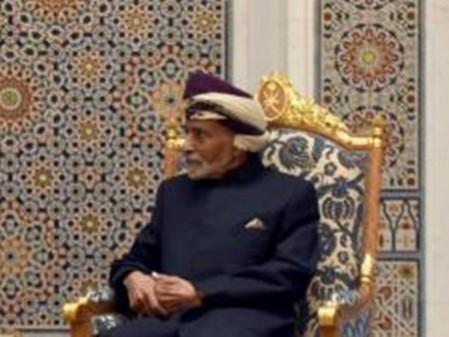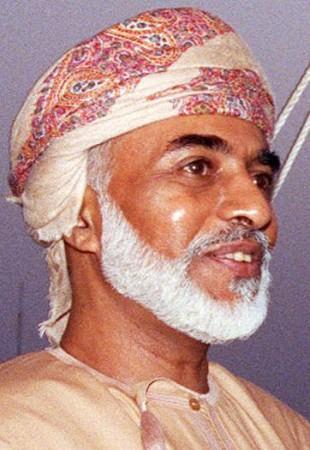
A state mourning has been declared by India over the death of Oman's Sultan Qaboos Bin Said Al Said, who died at the age of 79 after ruling the Arab country for nearly five decades.
The national flag will be flown at half-mast throughout Monday and there will be no official entertainment, the Ministry of Home Affairs said in a message which was shared with the Chief Secretaries of all the states and the administrators of all Union Territories.
"His majesty Sultan Qaboos Bin Said Al Said, Sultan of the Sultanate of Oman passed away on January 10, 2020. As a mark of respect to the departed dignitary, the government of India has decided that there will be one day's state mourning on January 13 (Monday) throughout India," the message said.
"The national flag will be flown at half-mast throughout India on the day of mourning and there will be no official entertainment on the day."
Sultan Qaboos's cousin Haitham bin Tariq Al Said was sworn-in on Saturday as his successor since the former had no heir.
Sultan Qaboos's death
The state-run Oman News Agency announced Sultan Qaboos's death late Friday on its official Twitter account.

ONA announced the news in a short message without providing details of the causes of the demise of the Sultan, who travelled to Belgium last month for a medical check-up, reports Efe news.
Oman has declared three days of mourning and shutdown of offices in both the public and private sectors following the loss of its leader. Flags will fly at half-mast for the next 40 days.
The Kuwait crisis and the Iraq-Iran war
His death comes at a time of heightened tension in the Middle East as Washington and Tehran have attacked one another on Iraqi territory.
The Omani Sultanate had called for calm, in line with Bin Said's policy of neutrality.
Under the Sultan, Muscat even mediated between conflicting countries in the volatile neighbourhood and sought to end the conflict in Yemen. Oman was the first Persian Gulf state to establish low-level ties with Israel.

Qaboos was born in the southern city of Salalah, the then-capital of the kingdom, and was the only son of Said bin Taimur and Princess Mazoon al-Mashani. He overthrew his father in 1970 in a bloodless coup with the help of the British.
Venerated in Oman, he is remembered as wise, righteous and the chief mediator in one of the most conflict-ridden regions of the world. He established ties with neighbouring Iran and even Israel.
He played a key role in the resolution of the Kuwait crisis and the Iraq-Iran war. The only conflict the Sultan had to face in his land was the Dhofar War (1962-1975) - which he inherited from his predecessor - where the southern rebels wanted autonomy until they were defeated by Qaboos five years after ascending to the throne.
Russian author Sergei Plekhanov, in his book "A Reformer on the Throne" - one of the few authorized biographies of the Sultan - explained that Said bin Taimur did not let Qaboos visit the Omani capital until he was 25 and deprived him of access to newspapers because he foresaw an opposition to his authoritarian policies.
However, his father sent him to Suffolk in England for education. There, he developed an interest in photography and classical music, which later led him to set up Oman's first opera and its choir.
After ascending the throne in 1970, and heavily influenced by the West and Zanzibar - his main country of reference - he sought to turn around the fortunes of Oman and its people.
He also placed much emphasis on education. By 1975, there were already 214 schools and in 1982, the first university, named Qaboos, was founded.
In addition, he set up a free, modern healthcare system - that went from having 150 doctors in 1975 to more than 3,500 in the present day - which significantly improved life expectancy and infant mortality.
Now, since Qaboos has died without leaving an heir, the Royal Family Council - comprising about 50 male members - should choose a new Sultan within three days of the throne falling vacant.
If the family cannot agree, members of the defence counsel and the chairmen of the Supreme Court, the Consultative Council and the State Council will open a sealed envelope in which Sultan Qaboos secretly recorded his choice and enthrone that person.
The sultan is the paramount decision-maker in Oman and also holds the positions of the prime minister, supreme commander of the armed forces, minister of defence, minister of finance and minister of foreign affairs.
(With agency inputs.)

















